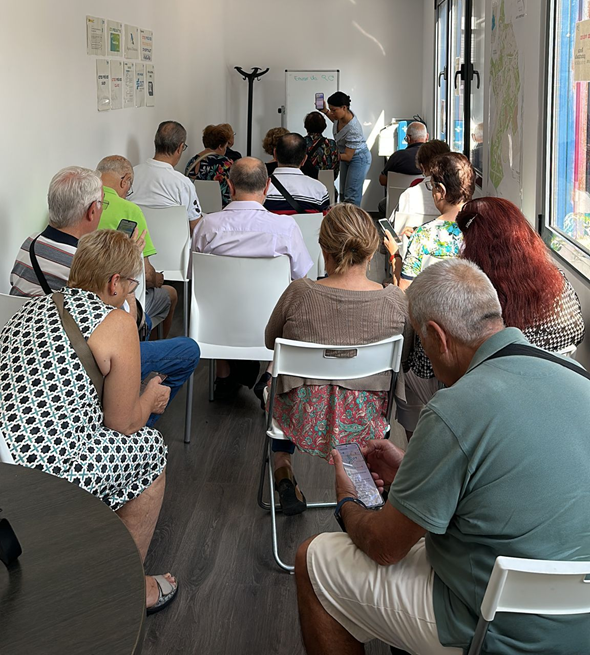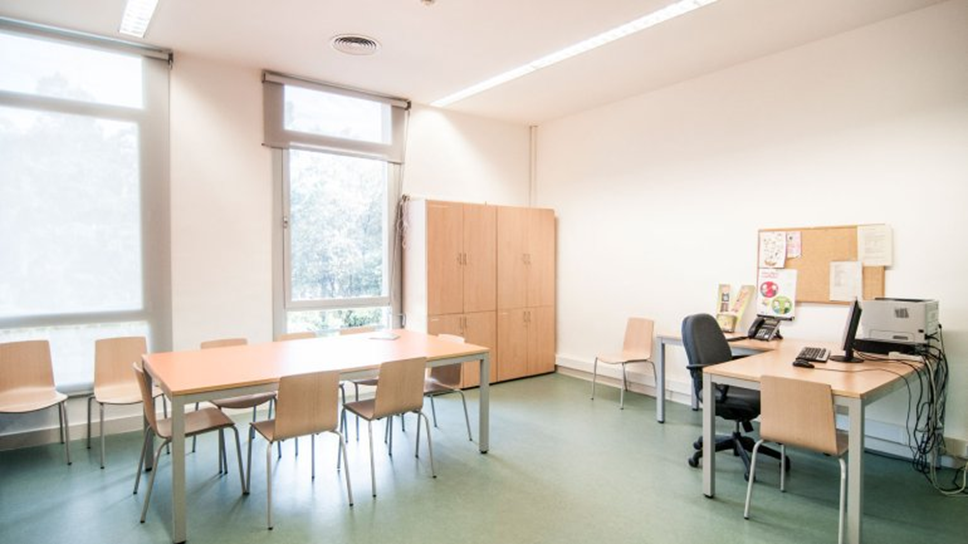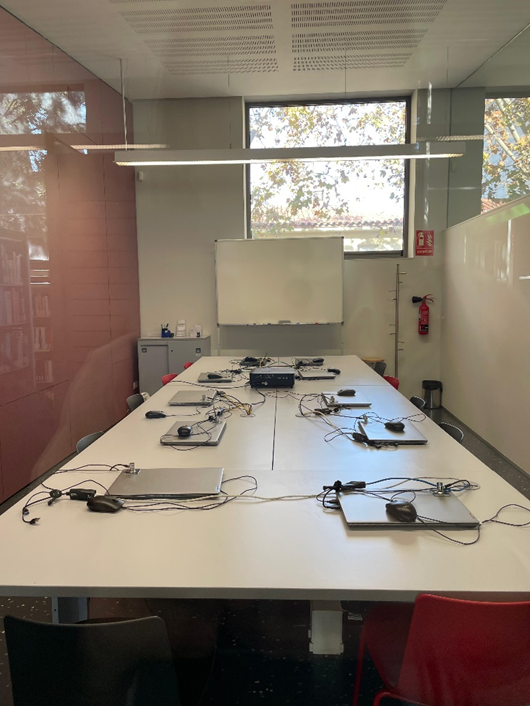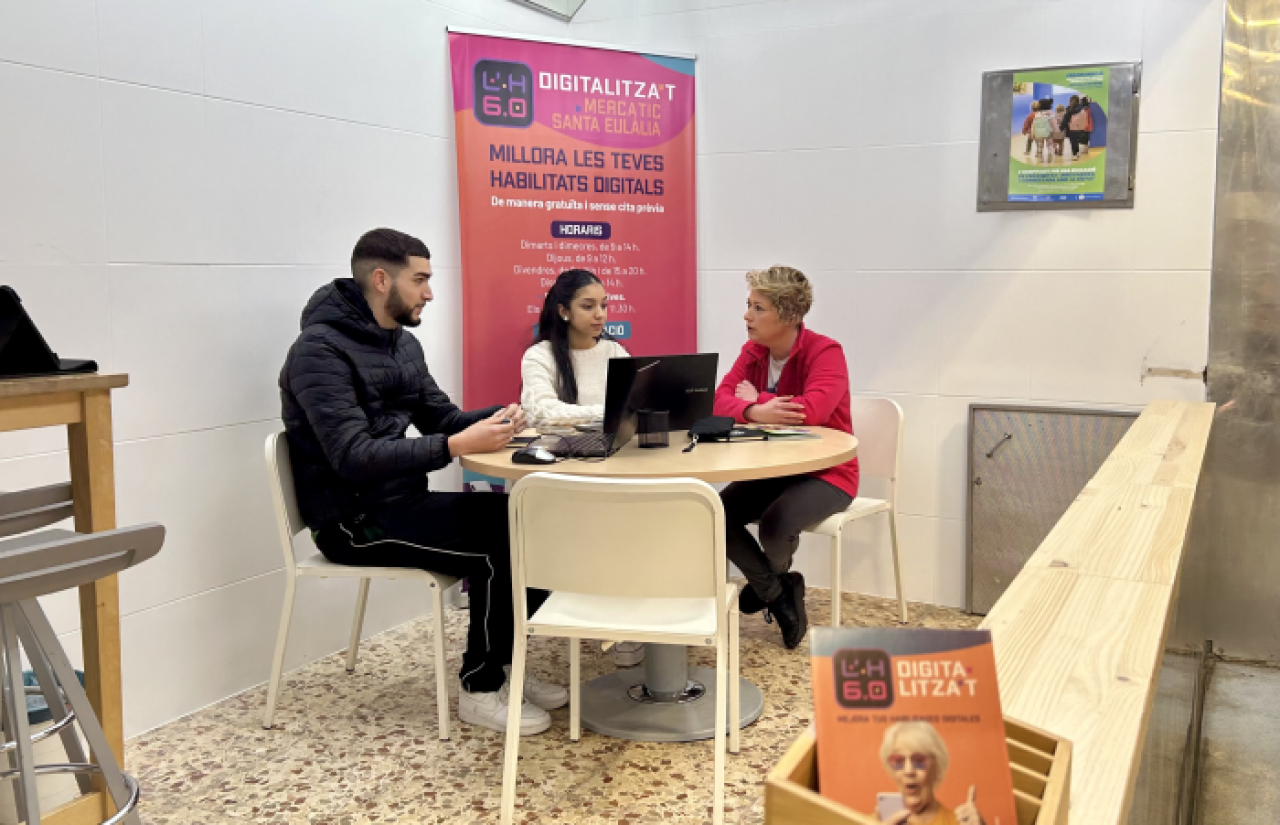These three examples illustrated different ways to approach and implement the concept of digital facilitators, and the visits allowed the team to understand the pros and cons of the various approaches and to consider what might work in Mollet. Here they explain the three projects they saw, what the projects offered, and what that prompted the team to think about for their own local Action Plan in Mollet.
“GO DIGITAL” Project – CITY COUNCIL OF HOSPITALET DE LLOBREGAT
“Go Digital” project was launched two years ago in one of the municipal centres in order to address two social problems in the territory: the employability of young people at risk of social exclusion and the digital disconnection of residents of the territory caused by the increase in digital procedures, and the lack of technical resources and digital skills of citizens.
In the first year, in 2022, a total of 15 young people were trained for two months, where young people learn basic digital tools, know all the existing services in the neighbourhood and municipality and how to accompany citizens and make them feel safe when carrying out procedures. Of these 15, four were hired. While this last year they have trained a total of 13 young people from the territory to be able to energize the points, and there are currently eight hired. Young people always have a social educator as a point of reference to be able to resolve doubts and the IT technician from the Sargim Foundation at their disposal.
From Monday to Thursday and without prior appointment, citizens can go to one of the five ICT points distributed throughout the city to receive advice. While on Fridays, training capsules are offered.
Furthermore, in February 2024, three new points were opened - a new municipal service aimed at guiding procedures via the internet and located in three municipal markets in the city that are also digital support points.
Young people are also in contact with municipal services such as Housing, OAC, Education, Social Services, etc. in order to let them know which procedures are most requested by citizens and if it is necessary to provide them with training so that they can then teach citizens how to do this procedure (minimum vital income, meal grant, rental assistance, etc.).
Some private companies are also showing interest in the service, such as “Aigües de Barcelona”, which has trained young people to help citizens in need.
Another derivative of the project is that, once a week, one of the young digital facilitators offers a 10-minute training capsule publicly on the local television.

Digital Support Service – CITY COUNCIL OF SANT CUGAT
The City Council has launched a new digital support service for all citizens to carry out online procedures, aimed mainly at people with difficulty owning or accessing electronic devices and internet access due to lack of resources. But also at the elderly, migrants with language difficulties, young people, etc.
The procedures and management are carried out with the support and advice of a professional social integrator who works in coordination with the Social Services department of the City Council. This professional has extensive knowledge on aids and subsidies and of the way of conveying requests depending on the user's profile. The sessions are tailor-made according to the user’s needs. This face-to-face service take place at two different municipal facilities: the Cultural Centre and the Citizen Service Office.
What does it offer?
Create your email
Request a digital certificate
Carry out telematic procedures
Apply for regional social funds
Generate pdf documents
To take advantage of this free service, citizens have to make an appointment by phone or WhatsApp.

Open Digital Classroom – CITY COUNCIL OF GRANOLLERS
The Open Digital Classroom is a service to support electronic processing and self-learning of digital skills offered by the libraries of Granollers, in collaboration with different municipal areas.
The service is offered in Can Pedrals and Roca Umbert libraries twice a week. The digital advice and support service in carrying out digital procedures accompanies citizens in the different activities:
- Processing digital identification and support in updating data on the administration's pages
- Carrying out electronic procedures
- Use of mobile devices and computers as a complement to programmed digital training
- Creation and management of email accounts, attaching and scanning documents, use of apps such as La Meva Salut or making video calls
The citizen who addresses it is referred from one of the referring entities through an internal appointment manager such as social services, new citizenship, housing or citizen’s service office.
The key difference with this project is that it is a referral from another service, rather than an open offer to citizens.

The learning for the city of Mollet del Vallès
The sturdy visits were extremely valuable and provided a range of insights and ideas for how to approach digital facilitators. Stakeholders from the project’s URABCT Local Group (ULG) also attended the visits and this provided an excellent opportunity, both for them to see the practices first hand, but also to prompt discussions and debate internally which helped to shape the thinking for their own work and potential Actions.
The members of the Mollet ULG are now clear that they want to have digital facilitators located in the municipal services or buildings, and that they want to combine the different perspectives from the other examples. They are clear that “cut and paste” won’t work and that they will need to adapt and combine the ideas into their own version that is aligned with local needs and resources.
They will start to test some of these ideas, knowing that they can’t instantly solve everything and that some review and adjustment will be needed as the development the new service. But one thing is clear that the making these visits along with the local stakeholders has been crucial to gaining better understanding of the options and building commitment within the local group to move things forward into practical actions that will meet the needs of the citizens of Mollet del Vallès.


